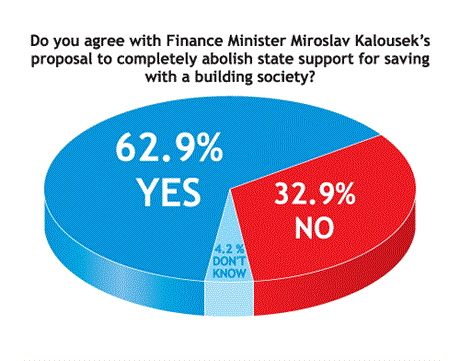The Constitutional Court (ÚS) has upheld a complaint filed by 45 Social Democrat (ČSSD) members of the Chamber of Deputies, quashing a government-proposed law on decreasing state support for saving with a building society. The court said on April 27 that in passing the law, the government abused the state of legislative emergency.
As part of its austerity measures, the center-right government coalition of the Civic Democrats (ODS), TOP 09 and Public Affairs (VV) decided to reduce state support for saving with a building society by half from 2012 — and to impose a 50 percent tax in 2010. The ÚS ruled that the government is entitled to reduce the annual state allowance for saving with a building society, but it has to adopt the changes through the usual parliamentary methods.
Following this, Finance Minister Miroslav Kalousek (TOP 09) declared that the ÚS ruling comes down to an elimination of planned savings on state expenditure amounting to at least Kč 6 billion. He therefore intends to reintroduce the bill on reducing state support for saving with a building society in a different form. From 2012 he would, however, prefer to completely do away with state support for saving with a building society in respect of both old and new contracts.
In so doing, he could save up to Kč 13 billion. These measures would affect around 5 million Czechs who now receive this state support. Of the top managers questioned by Czech Position in its Voice of the Elite poll, 62.9 percent agreed with Kalousek’s proposal.
Among those interviewed are the following two respondents:
“State support for saving with a building society should have been canceled long ago, certainly after it became clear that this is simply a state-sponsored and nonsystemic means for the relevant financial institutions and their random clients to make money. ‘This instrument was adopted from Western Europe without any prior analysis.’This instrument was adopted from Western Europe without any prior analysis as to there was a need or desire to use this support for private housing. It is as pointless a ‘monument’ erected by some right-wing politician as the law proposal by the Civic Democrats introducing credit unions was.”
“It is complete nonsense. Almost all the state support is used as an elegant means of boosting deposit portfolios and is in no way used as a tool for financing housing.”
A contrary opinion is voiced by this manager:
“State support for saving with a building society is important; it motivates people to make long-term savings with the purpose of investing into personal assets. There is nothing exclusively Czech about this; in western countries this represents a main — and extremely — successful pillar for creating assets and also a possibility to free oneself of a lifelong burden of paying high rents. It also dramatically reduces the chance that property owners get into financial trouble when they end their economically active lives and face a reduction of their income,” the manager began. ‘If the state discovers the resources had been spent on something else, then it should demand all its financial support be returned.’
“It is, therefore, in the interests of saving banks and the state that as many people as possible participate in this creation of assets. It is, however, important to take heed that these resources saved with state support are really spent on the originally intended purposes — on real estate, that is, and on nothing else. This would be easy to check; if the state discovers the resources had been spent on something else, then it should demand all its financial support be returned.”
This answer is in favor of abolishment, but not unequivocally so:
“Conditionally I’m in favor of a cancellation because state support for saving with a building society can be considered a tax bonus for half the nation — for the middle classes and the less well-off (but not for the least well-off). This bonus is paid for by the taxpayer and is therefore simply just a part of the redistribution process aimed at keeping financial capital inside the Czech economy. However, if support for this kind of savings is simply terminated without it being compensated by a corresponding tax brake, it will only increase the tax burden” this manager said, adding that we woul d risk that the freely available portion of this capital flows abroad to places with a better investment environment then exists here. ‘From a center-right government I’d expect the role of the state … to be reduced again.’
“Abolishing saving with a building society is just one little piece of a mosaic titled ‘We are a government of budgetary responsibility (meaning we will decrease the budget deficit) and you taxpayer will pay for it’ currently being created by Finance Minister Miroslav Kalousek,” the manager continued. “This government hasn’t, as yet, come up with anything but wall-to-wall wage cuts and, to all intends and purposes, won't produce anything else in the future. From a center-right government I’d expect the role of the state — which tends to be too big under Social Democratic governments — to be reduced again.”
The following negative answer criticizes Finance Minister Kalousek and his proposal:
“The Czech government has approved documents in which support for saving with a building society is rated as an effective tool to support housing and housing construction. Without even assessing the effectiveness of this system it decided to cut state support — also retroactively. After the Constitutional Court intervened the government came up with a crafty solution — to simply do away with the support altogether. The government is not acting in a way that is customary in civilized countries — predictably, with an appropriate level of legal security and, above all, conceptually,” this respondent said before asking whether we knew the answers to several questions.
“Do we need state assistance for housing? Which instruments are at our disposal and to what purpose are they used? Which instrument is the most effective in achieving the set objective? What are the negative consequences of applying the given instruments?” ‘The minister must above all serve as an example and act as a public servant rather than a Byzantine ruler.’
The manager added that rather than looking for solutions, Finance Minister Kalousek is creating new problems. “The ministry is not an absolutist empire, and the minister must above all serve as an example and act as a public servant rather than a Byzantine ruler. The administration of public affairs should be bound to clear and comprehensible rules and not be subject to vagary, mood-changes and ad-hoc ideas.”
This respondent is, however, taken in by Kalousek’s proposal:
“With a view to the state of our public finances I consider supporting saving with a building society — which has really nothing to do with support for housing — as an incongruous waste of public resources. This product is, moreover, not compatible with the market. As it happens, all building societies are owned by foreign investors. We are therefore merely enabling these financial groups, and no one else, to achieve above-standard profits amounting to billions of crowns. All this capital is spirited out of the Czech Republic and is exclusively used to save the foreign parent banks such as Erste, KBC, Societé Générale or Raiffeisen.”
Tough criticism of Minister Kalousek is meted out in his negative answer:
“Finance Minister Kalousek’s reasoning may perhaps sound logical to some, but in reality the abolition of this [support] would have a counterproductive impact on the economy. You won’t solve the sorry financial state of a family of an alcoholic wife and a gambler husband by confiscating the children’s piggy bank!,” this respondent began. ‘Now this traitor to the nation, Kalousek, is trying to eliminate the last saving benefits for citizens.’
“The government promised systemic savings in the way the state apparatus is run. It, however, only managed the save a bare minimum, and this only for appearance's sake as the state deficit is increasing ever faster. First of all, the government is absolutely not pursuing any systematic thought-through saving measures. Under the accompaniment of a loud media circus it completely thoughtlessly imposed a wall-to-wall wage decrease for state employees. Now this traitor to the nation, Kalousek, is trying to eliminate the last saving benefits for citizens. At a time when bank charges often exceed the interest on deposited money, this is a saving measure only an idiot could invent. This is pure economic amateurism because any first year economics student knows that a country’s economy is dependent on the level of savings made by its citizens,” the respondent continued.
“It is not just economic nonsense. It is also morally and systemically wrong because it is better for everyone if people are given the opportunity to save in a systematic and meaningful way — i.e., if they can expect some appealing bonus for saving in return. And in terms of both the national economy and the citizens it is irrelevant whether someone buys a new flat, car or fridge for the weekend home from the saved money,” the respondent said, adding that that higher tax breaks are currently already only applicable when it concerns housing.
“Under these vociferously advertised ‘necessary’ changes this goat in the guise of a gardener is instead pursuing the collapse of our economy. And apart from seditious below-the-belt campaigns aimed at inconvenient partners within his own cabinet Kalousek’s only achievement has been the largest state deficit in the history of the independent Czech Republic.”
This top manager supports Minister Kalousek:
“This form of state assistance should be abolished. Building societies are, however, well-functioning financial institutions operating with considerable financial reserves and should therefore not be allowed to fall. State support should be transformed — the senseless purpose of construction activities should be abolished and extended to, say, commercial supplementary pension insurance which would be helpful to the system. If we simply do away with this state assistance then this will lead to less saving among private persons and higher consumption and that would not be a way for the government to admonish citizens to become much more financially independent.”


